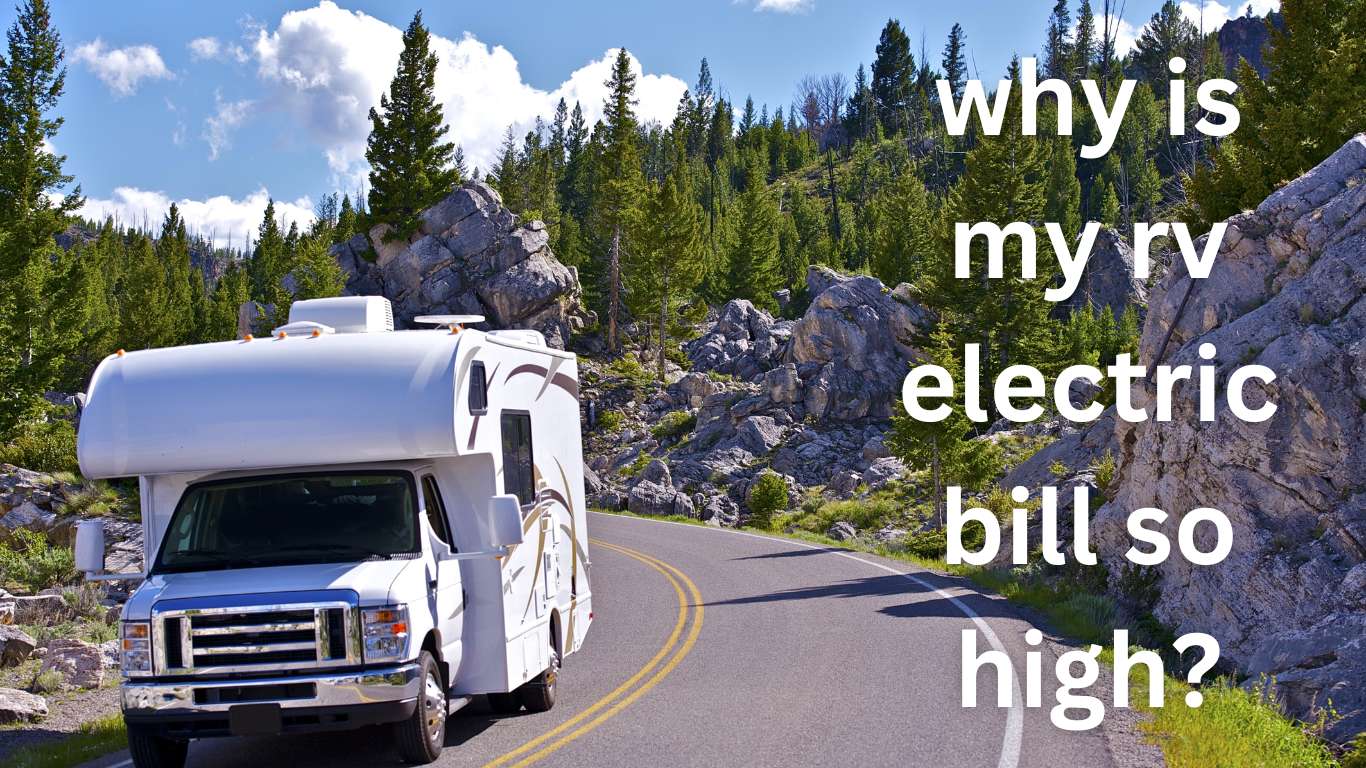High RV electric bills can be a frustrating issue for many RVers. Understanding the reasons behind this can help you save money and reduce energy consumption. Let’s explore the most common causes of high electric bills in your RV and how to address them.
Common Reasons for High RV Electric Bills
1. Inefficient Appliances in Your RV
Older or energy-inefficient appliances, such as air conditioners or refrigerators, can use a lot of electricity. Over time, these appliances become less efficient, leading to higher energy usage.
Tip: Consider upgrading to energy-efficient models to reduce power consumption.
2. Excessive Use of Heating and Cooling Systems
Running your RV’s heating or air conditioning systems for long periods can significantly increase your electric bill. These systems are among the largest energy consumers in an RV.
Tip: Use insulation, window covers, and energy-saving thermostats to maintain a comfortable temperature without overusing your HVAC system.
3. Phantom Power Usage
Even when turned off, some devices like TVs, microwaves, and chargers continue to draw power. This “phantom power” adds up over time.
Tip: Unplug devices when not in use or invest in a power strip with an on/off switch.
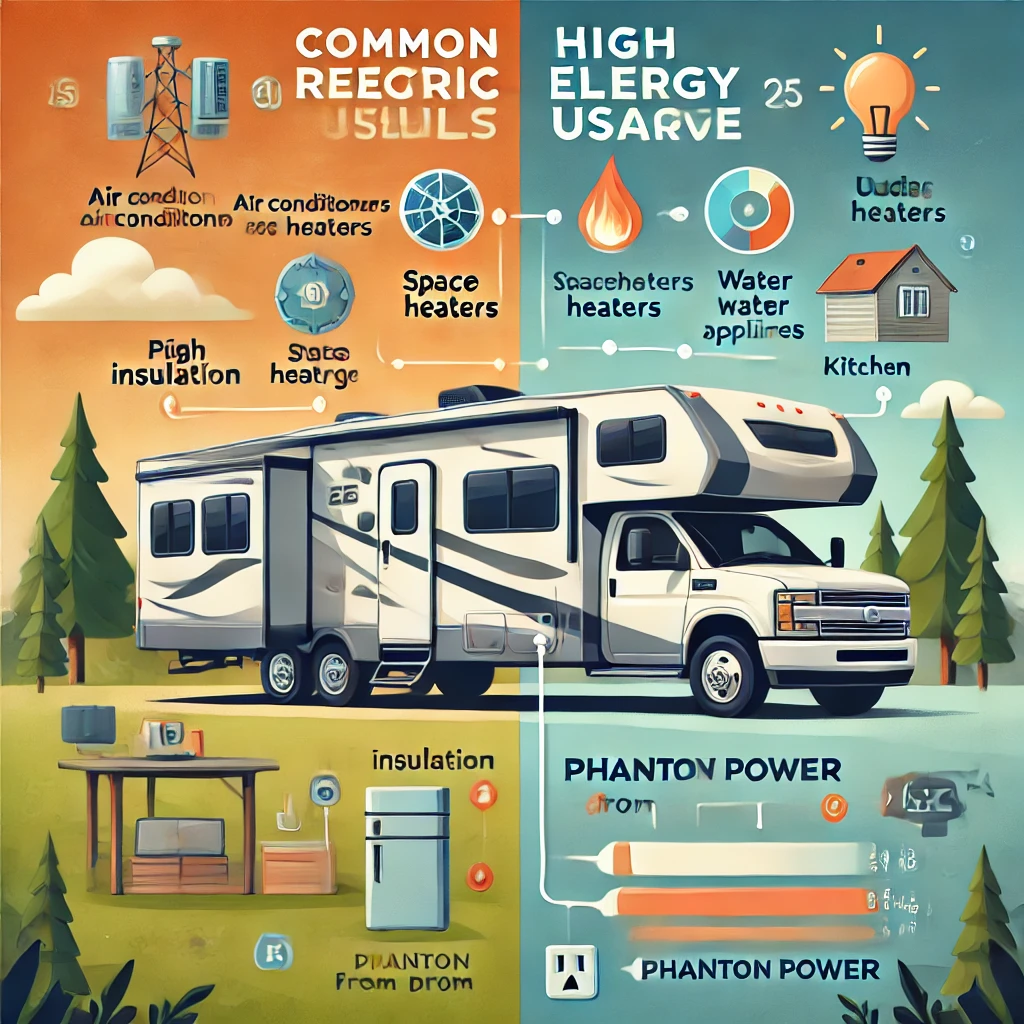
How Weather Impacts Your RV Electric Bill
Extreme Temperatures Require More Energy
In hot or cold climates, your RV’s systems work harder to maintain comfortable temperatures, increasing electricity usage.
Tip: Park in shaded areas during summer and insulate windows in winter to minimize energy demands.
Practical Ways to Lower Your RV Electric Bill
1. Switch to LED Lighting
LED lights consume significantly less power compared to traditional incandescent bulbs.
2. Use Solar Panels
Installing solar panels can offset your energy consumption, especially if you’re frequently boondocking.
3. Monitor Your Electricity Usage
Invest in an energy monitor to identify which devices use the most power and adjust your habits accordingly.
Does an RV Use a Lot of Electricity?
RV electricity usage depends on the size of the RV, the appliances being used, and your lifestyle. While RVs are designed to be energy-efficient, certain factors can lead to high power consumption. Let’s break it down to help you understand how much electricity your RV uses and how to manage it effectively.
Key Factors That Affect RV Electricity Usage
1. Appliances and Devices
RVs come equipped with essential appliances such as air conditioners, refrigerators, microwaves, and TVs. These devices can consume a lot of electricity, especially when used simultaneously.
Tip: Opt for energy-efficient appliances to minimize consumption.
2. Heating and Cooling Systems
Air conditioners and space heaters are some of the biggest energy consumers in an RV. Extreme weather can force these systems to work harder, significantly increasing electricity usage.
Tip: Use fans or portable heaters as alternatives to save energy.
3. Lighting Choices
Traditional incandescent lights use more energy compared to modern LED lighting.
Tip: Switch to LED lights to reduce electricity use without compromising brightness.
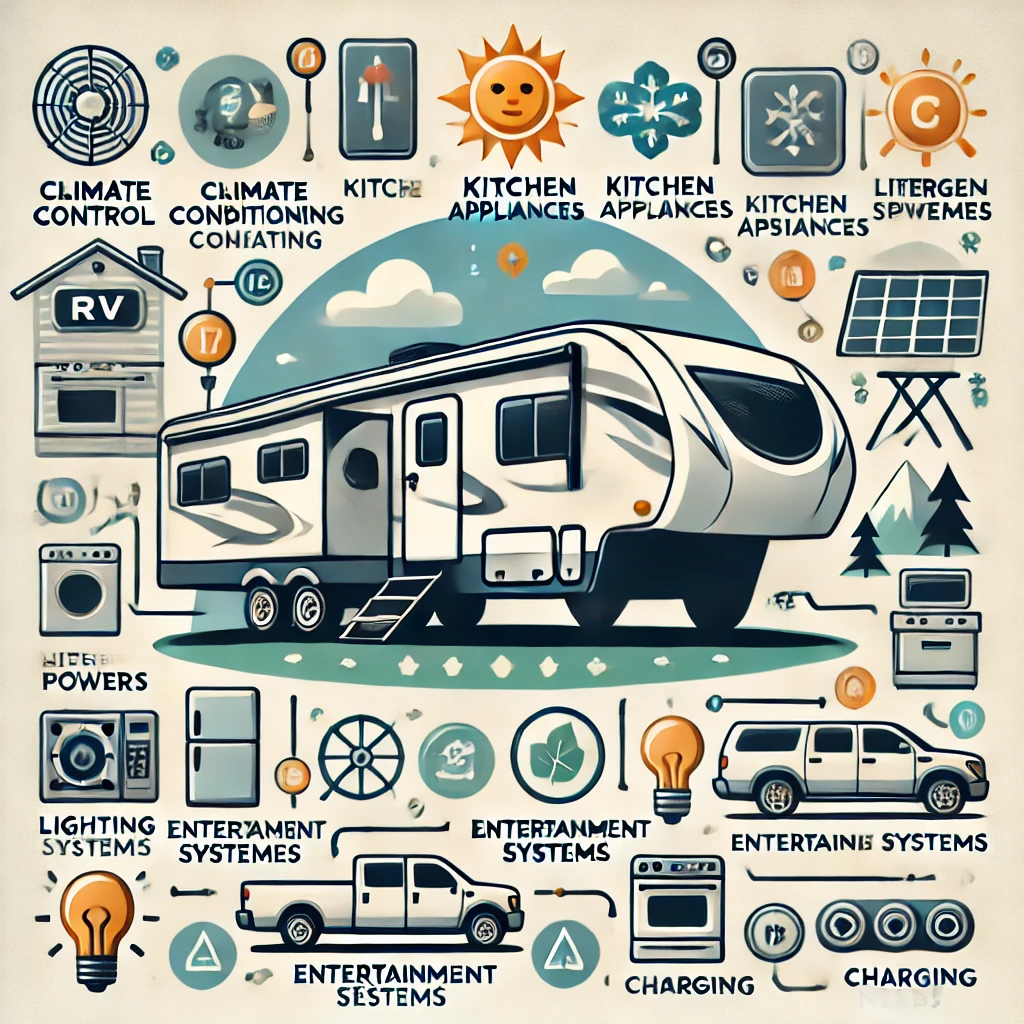
How Much Electricity Does an RV Typically Use?
Daily Usage Estimates
- Small RVs: Around 20-30 kWh per day, depending on usage.
- Larger RVs: Can consume 50+ kWh daily with multiple appliances running.
This varies greatly depending on whether you’re hooked up to shore power, using a generator, or relying on solar panels.
Tips to Reduce RV Electricity Usage
1. Be Mindful of Appliance Usage
Run major appliances like microwaves or air conditioners only when necessary.
2. Invest in Solar Power
Solar panels can offset your electricity needs, especially when camping off-grid.
3. Insulate Your RV
Good insulation keeps the temperature stable, reducing the need for excessive heating or cooling.
What Is the Average Electric Bill for an RV?
The average electric bill for an RV depends on factors like the size of the RV, the appliances you use, and whether you’re stationary or traveling. Understanding these variables can help you budget effectively and manage your electricity usage.
Average Monthly RV Electric Bill
1. RVs in Campgrounds or RV Parks
When hooked up to shore power, the cost is often included in your campground fees. However, in long-term stays where electricity is billed separately, the average monthly cost ranges between $50 and $200, depending on usage.
2. Boondocking or Off-Grid RVing
When boondocking, your costs may come from generator fuel or maintaining solar power systems. This can range from $0 to $100 per month, depending on your setup and energy needs.
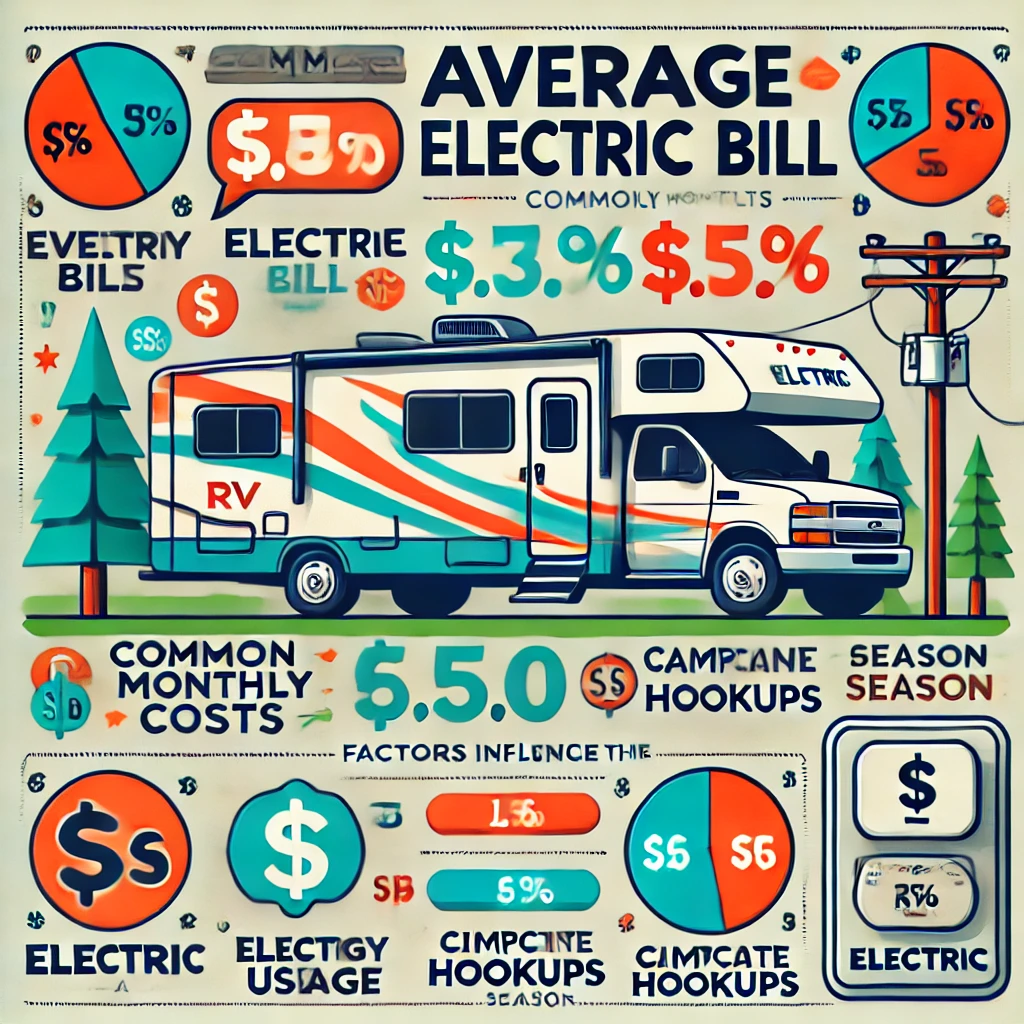
Factors That Influence Your RV Electric Bill
1. Size of the RV
Larger RVs with multiple air conditioners, appliances, and electronics will naturally use more electricity compared to smaller campers or travel trailers.
2. Heating and Cooling Costs
Air conditioning in summer or electric heaters in winter can be major contributors to your electric bill.
Tip: Use energy-efficient space heaters or fans to reduce costs.
3. Appliance Usage
Heavy usage of appliances like microwaves, TVs, and electric water heaters can quickly increase your electricity consumption.
Tip: Limit simultaneous appliance use to save energy.
4. Climate and Location
Extreme temperatures require heating or cooling systems to run longer, leading to higher energy bills.
Tip: Park in shaded areas during summer and insulate your RV during winter.
How to Keep Your RV Electric Bill Low
1. Switch to LED Lighting
LED lights are highly energy-efficient and can significantly reduce your electricity costs.
2. Use Solar Panels
Installing solar panels can offset electricity costs, especially if you enjoy off-grid camping.
3. Monitor Your Usage
Invest in an energy monitor to track your consumption and identify high-usage appliances.
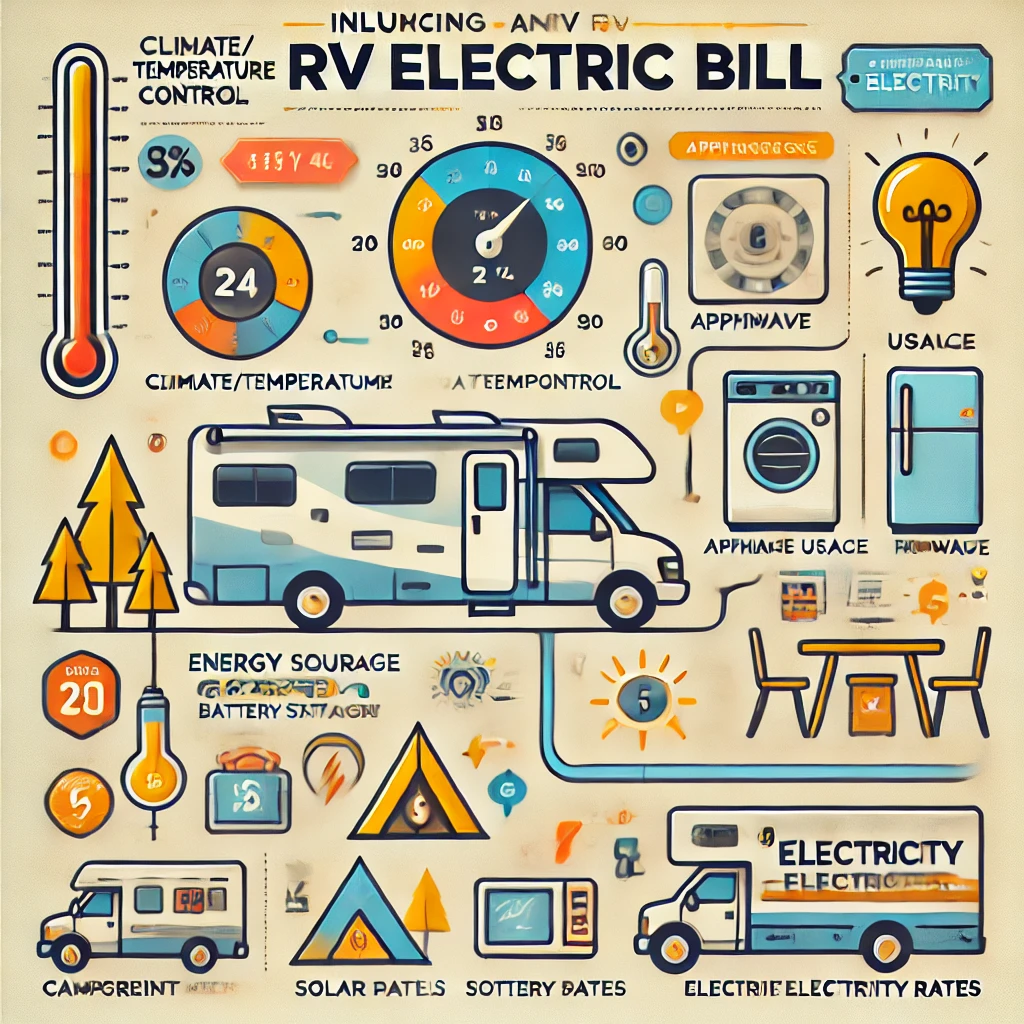
What Would Cause a Very High Electric Bill in Your RV?
A sudden spike in your RV’s electric bill can be alarming, but identifying the causes can help you manage costs effectively. From energy-hungry appliances to inefficient systems, several factors can lead to unusually high electricity consumption. Let’s explore the most common reasons and how to address them.
Common Causes of a Very High RV Electric Bill
1. Overuse of Heating and Cooling Systems
Heating and air conditioning systems are some of the biggest power consumers in an RV. If you’re running these systems constantly, especially during extreme weather, your electric bill can skyrocket.
Tip: Use insulation, weatherstripping, and energy-saving thermostats to reduce dependency on HVAC systems.
2. Energy-Intensive Appliances
Frequent use of power-hungry appliances like microwaves, electric water heaters, and hair dryers can quickly add to your electricity costs.
Tip: Limit usage during peak hours or switch to propane-powered alternatives when possible.
3. Phantom Power Drain
Many devices, such as TVs, chargers, and entertainment systems, continue to draw power even when turned off. This “phantom drain” can add up significantly over time.
Tip: Unplug devices when not in use or use power strips with on/off switches.
4. Inefficient Lighting
If your RV still uses incandescent bulbs, you’re likely consuming more power than necessary.
Tip: Switch to LED lighting, which uses far less electricity and lasts longer.
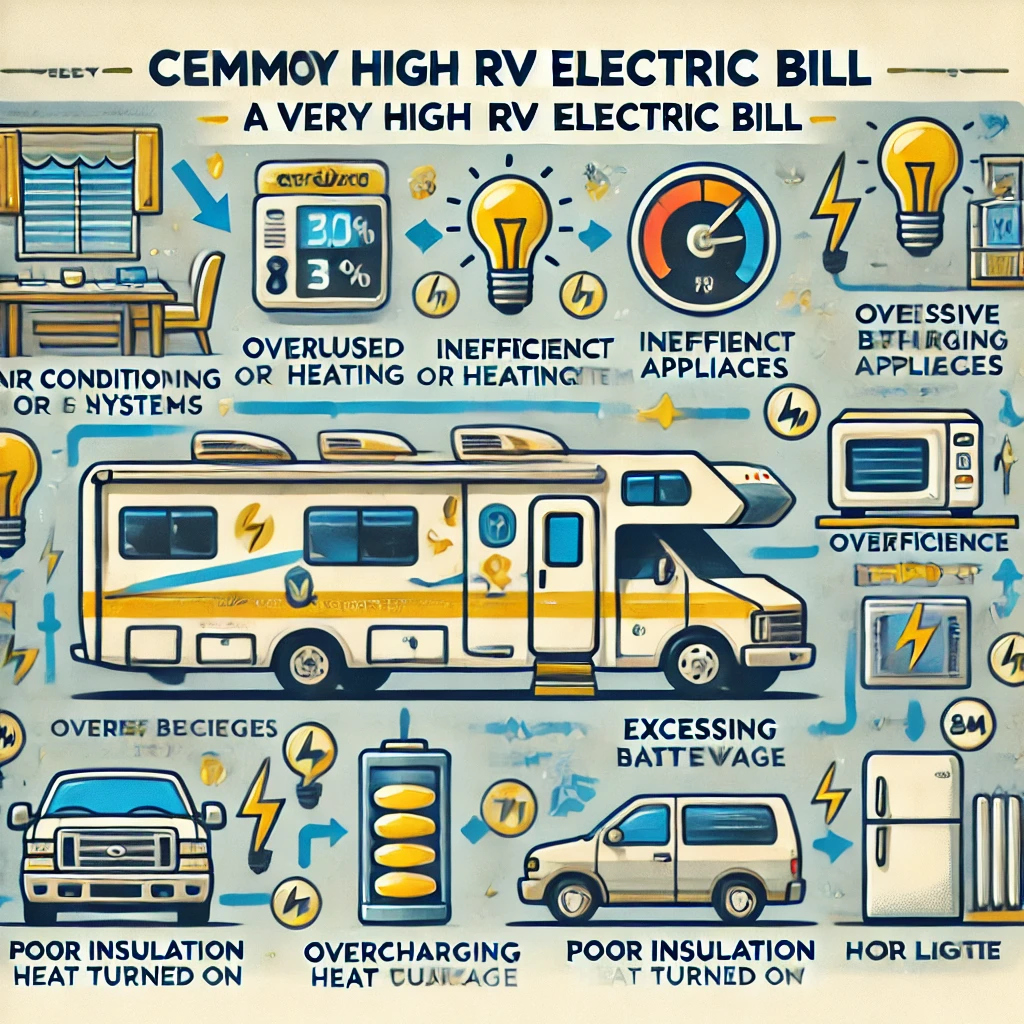
Less Obvious Causes of High Electric Bills
1. Malfunctioning Appliances
A faulty refrigerator, water heater, or air conditioner can consume more electricity than normal.
Tip: Perform regular maintenance and replace worn-out appliances to ensure efficiency.
2. Poor Insulation
Drafty windows and poorly insulated walls force your heating and cooling systems to work harder, increasing electricity usage.
Tip: Add insulation and seal any gaps to reduce energy loss.
3. High Standby Generator Use
If you’re running a generator frequently, it can inadvertently increase fuel and electricity costs, especially if not used efficiently.
Tip: Supplement power needs with solar panels to offset generator usage.
How to Reduce Your RV Electric Bill
1. Monitor Electricity Usage
Use a portable energy monitor to track your consumption and identify problem areas.
2. Upgrade Appliances and Systems
Invest in energy-efficient appliances and solar panels to reduce reliance on shore power.
3. Park Strategically
Choose shaded spots in summer and sunny locations in winter to reduce heating and cooling demands.
How Can I Lower My RV Electric Bill?
Lowering your RV electric bill doesn’t have to be complicated. With a few smart strategies, you can reduce electricity usage while enjoying all the comforts of RV living. Let’s explore effective ways to cut down on energy costs in your RV.
Practical Tips to Lower Your RV Electric Bill
1. Switch to LED Lighting
Traditional incandescent bulbs consume significantly more energy than LED lights. Upgrading to LED lighting is an easy and effective way to save electricity.
Tip: LED bulbs are long-lasting and use up to 75% less power than standard bulbs.
2. Use Energy-Efficient Appliances
Older appliances like air conditioners, refrigerators, and water heaters can be power-hungry.
Tip: Upgrade to energy-efficient models designed for RVs to save on electricity.
3. Optimize Heating and Cooling Usage
Heating and cooling systems are often the biggest energy consumers in an RV.
Tips to Save Energy:
- Use fans or space heaters as alternatives when possible.
- Park in shaded areas during summer and insulate windows in winter.
- Use a programmable thermostat to maintain efficient temperature control.
4. Unplug Unused Devices
Many devices, such as chargers and TVs, continue to draw power even when not in use. This “phantom power” can add up over time.
Tip: Unplug devices or use power strips to cut off standby power consumption.
5. Install Solar Panels
Solar panels are a great way to generate your own electricity, especially if you enjoy boondocking or off-grid camping.
Tip: Start with a small solar setup and expand as needed to offset your RV’s power usage.
Advanced Energy-Saving Tips
1. Insulate Your RV
Adding insulation to windows, doors, and walls reduces the need for excessive heating or cooling, lowering energy costs.
2. Monitor Your Electricity Usage
An energy monitor can help you track which appliances are using the most power.
3. Choose Efficient RV Parks
Some RV parks offer flat-rate electricity, while others charge based on usage. Choosing parks with inclusive rates can help manage costs.
Quick Wins to Save Electricity
- Replace standard bulbs with LEDs.
- Use solar-powered gadgets for small tasks.
- Run major appliances only when necessary.
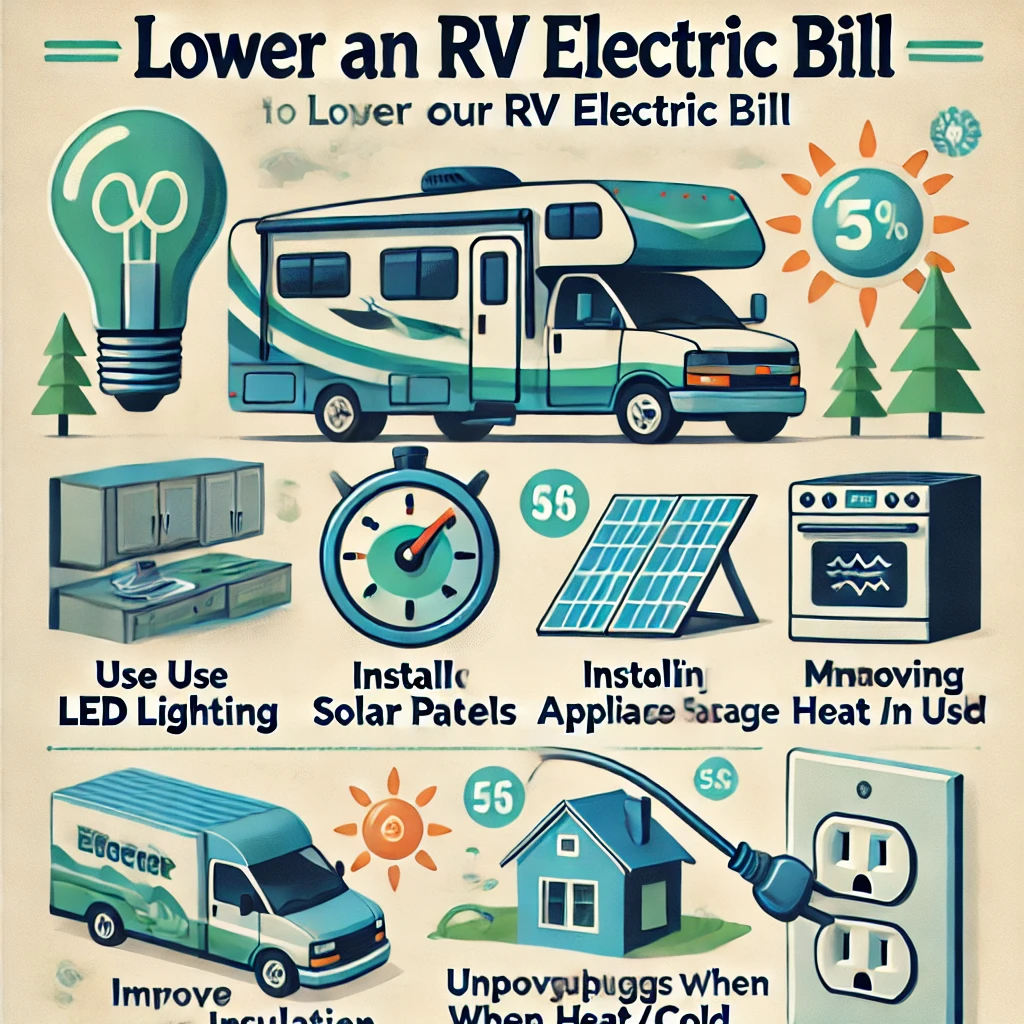
More related information will be available on Flamingo Motorhomes.

